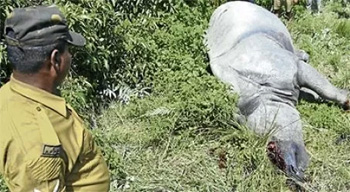HE Dr Zulkifli Hasan
Minister of Forestry
Ministry of Forestry
Gedung Manggala Wanabakti
Blok I Lt. 8, Jalan Gatot Subroto
Jakarta 10270
Indonesia.
Your excellency,
Thank you very much for the kind invitation to attend the First Asian Rhino Range States Meeting. Unfortunately, my travel plans do not allow me to join you in person but I would like to extend a warm welcome to the participants and to congratulate the Government of Indonesia for its leadership and for driving this important initiative.

- A rhinoceros killed by poachers in India. (AFP pic)
As you know, there are five species of rhinoceroses, all included in the CITES Appendices. The three Asian rhino species are listed in CITES Appendix I. The Java and Sumatran rhinos are considered to be as critically endangered and Indian rhinos as vulnerable in the IUCN’s Red List. The Javan rhino subspecies in Viet Nam was declared extinct on 25 October 2011. A small population of Javan rhinos still exists in Indonesia, which has prompted this important discussion.
The future of the Asian rhinos depends on concerted action being taken by range States with the support of the international community. We have indeed been fortunate for the leadership shown by countries across the Asian rhino's range - Indonesia, together with Bhutan, India, Malaysia and Nepal - in bringing this critical issue to the table in Bandar Lampung.
Rhino’s range States played a very active role during the 16th meeting of the Conference of the Parties to the Convention on International Trade in Endangered Species of Wild Fauna and Flora (CITES CoP16) held in Bangkok, Thailand, in March of this year. At this meeting, CITES Parties took decisive action to tackle the disturbing spike in the illegal killing of the African and Asian rhinos and smuggling of their horn to profitable markets. In particular, the Conference adopted Decisions 16.84 and 16.85.
In this context, we respectfully invite all participating States to deploy their collective efforts to fully implement these Decisions and we encourage all of you to support the draft Communiqué submitted for your consideration at this meeting.
The CITES Secretariat is working closely with its partners of the International Consortium on Combatting Wildlife Crime (ICCWC), a joint initiative of the CITES Secretariat, INTERPOL, the United Nations Office on Drugs and Crime, the World Bank and the World Customs Organization, to strengthen law enforcement capabilities to combat rhino poaching and the smuggling of their horns. I take this opportunity to offer our support to front line officers working with ICCWC in the five range States of the Asian rhinos to minimize rhino poaching and the smuggling of rhino horns.
We also need to focus on tackling the underlying drivers of wildlife crime. Understanding the interlinkages between ecosystem and species based approaches, invasive plants, international trade, sustainable development and national security is critical to combat worrying trends in poaching and smuggling that are putting at risk our natural heritage. We are currently working with several donors to support the best possible and most practical responses to the challenges faced by Asian countries and other regions of the world. We can move very quickly in this regard, building upon existing soft and hard infrastructure that is already in place and working well.
Thank you once again for your strong leadership in seeking to bring greater coherence to the ‘on the ground’ implementation of critical actions aimed at the conservation and recovery of the Asian rhino populations.
I wish you every success in your deliberations and look forward to hearing about the outcomes from your meeting and to seeing you in the near future.
See also: